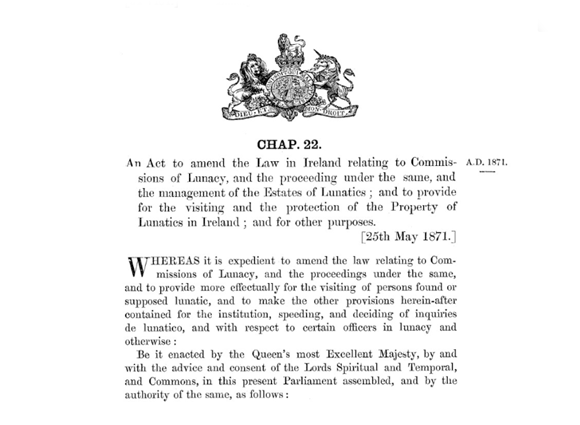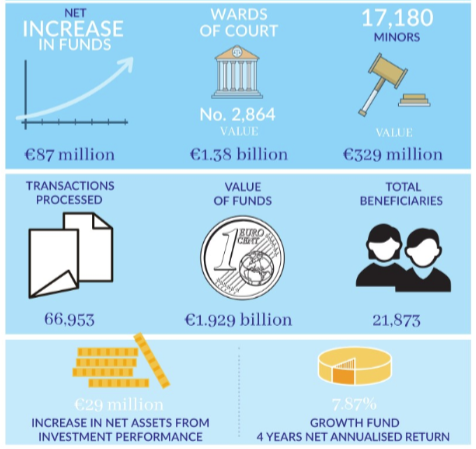Wards of court
Archaic legislation governing wardship

There was great hope for change when the UN Convention on the Rights of Persons with Disabilities was adopted on 13 December 2006 at the United Nations Headquarters in New York and was opened for signature on 30 March 2007.
From the point that Ireland signed the UN Convention, people with disabilities were very hopeful for change in terms of having their voices heard and making their own decisions.
In order to comply with the Convention, the Government Drafted Heads of a Bill which eventually became the Assisted Decision Making (Capacity) Act 2015. This Act set out the manner in which the UNCRPD would be met for Wards of Court, which included the discharge of all adult Wards from Wardship, when the new Decision Support Service to provide a range of supports to persons with impaired capacity, would be set up.
Link to the Act:
http://www.irishstatutebook.ie/eli/2015/act/64/enacted/en/html

Numerous commitments have been made regarding the ratification of the UN Convention but it was only in March 2018 that the Convention was ratified – without the Optional Protocol being ratified – which would have enabled individuals to take a complaint directly to the UN about non compliance with the Convention. The Convention entered into force on 19 April 2018.
The Government has made commitments to establish the Decision Support Service to replace the Office of Wards of Court and a Director of the Decision Support Service was appointed in 2017 – Link to the Mental Health Commission/Decision Support Service for further information. https://www.mhcirl.ie/DSS/
Further information also on the NDS website: http://nda.ie/Disability-overview/Legislation/UN-Convention-on-the-Rights-of-Persons-with-Disabilities.html
Irish Human Rights & Equality Commission:
Emily Logan, Chief Commissioner of the Irish Human Rights and Equality Commission stated:
“The outcome of this case has significant implications for the rights and protections afforded to people whose ability to make significant life decision may be questioned, including their right to have their voices heard and to be afforded the dignity of being consulted on decisions which impact their lives.
“In particular the Commission welcomes the Supreme Court’s statement that makes it clear that people with disabilities are protected by the same constitutional guarantees and legal protections as any other person.”
Despite all of this time passing – the Decision Support Service is still not functional, the Office of Wards of Court continues to operate under the powers of the archaic 1871 Lunacy Regulations – in conflict with the UN Convention on the Rights of Persons with Disabilities and the Charter of Fundamental Rights of the European Union.How many Wards of Court – Report of the Accountant of the Courts of Justice 2018 shows that there are 2861 Adult Wards of Court and 17,180 Minors in the system.There are funds to the value of €1.9bn belonging to Wards and Minors being managed by the Office of Wards of Court/Courts Service.
The first State Report to the UN Committee on the Rights of Persons with Disabilities will take place in 2020. There is a large gap between what the State says it is doing/will do and what is actually happening.
More and more people are being taken into Wardship, particularly people with disabilities and mental health problems – and the HSE is increasingly involved in pushing people into Wardship – without the protections required to enable these individuals to have independent representation, reviews or enquiries. This is happening at a time when we would expect wardship applications to cease. It is a serious abuse of the human rights of these individuals.
https://www.ckt.ie/news/President_%20Reaffirms_Wardship_Jurisdiction/
“This Judgment serves to clarify and reaffirm that, while the Wardship jurisdiction is wider than under previous Presidents of the High Court, it remains the exclusive jurisdiction of the President of the High Court.”
Despite all of this time passing – the Decision Support Service is still not functional, the Office of Wards of Court continues to operate under the powers of the archaic 1871 Lunacy Regulations – in conflict with the UN Convention on the Rights of Persons with Disabilities and the Charter of Fundamental Rights of the European Union.How many Wards of Court – Report of the Accountant of the Courts of Justice 2018 shows that there are 2861 Adult Wards of Court and 17,180 Minors in the system.There are funds to the value of €1.9bn belonging to Wards and Minors being managed by the Office of Wards of Court/Courts Service.
The first State Report to the UN Committee on the Rights of Persons with Disabilities will take place in 2020. There is a large gap between what the State says it is doing/will do and what is actually happening.
More and more people are being taken into Wardship, particularly people with disabilities and mental health problems – and the HSE is increasingly involved in pushing people into Wardship – without the protections required to enable these individuals to have independent representation, reviews or enquiries. This is happening at a time when we would expect wardship applications to cease. It is a serious abuse of the human rights of these individuals.
https://www.ckt.ie/news/President_%20Reaffirms_Wardship_Jurisdiction/
“This Judgment serves to clarify and reaffirm that, while the Wardship jurisdiction is wider than under previous Presidents of the High Court, it remains the exclusive jurisdiction of the President of the High Court.”

How many Wards of Court – Report of the Accountant of the Courts of Justice 2018 shows that there are 2861 Adult Wards of Court and 17,180 Minors in the system.
There are funds to the value of €1.9bn belonging to Wards and Minors being managed by the Office of Wards of Court/Courts Service

FUNDS
There is much concern amongst families about the manner in which funds are handled. No accounts had been sent out over decades until 2017 and this is just a valuation sheet – it does not include a Statement showing the payments in and out, performance of the investment fund and so on. Families may request further information (if they know what to look for). Families of Wards under the General Solicitor are not entitled to any information about funds, despite a response to a Parliamentary Question stating that this could be provided.
These matters are dealt with in the Oireachtas Committee Reports
(links below)…

WITHOUT PROPER PROTECTIONS UNDER THE ARCANE 1871 LUNACY REGULATIONS
It can happen to anyone – and suddenly – it may be a person who is already vulnerable due to disability or old age or occur as a result of an illness or injury. Another person may make an application without you even knowing about it. Families report service of Petitions for Wardship being served without the person even knowing. It is just left on a bed or in a bedside locker and it is served. There is no support or representation available and it is being exploited – cui bono?
Families need to be vigilant of their vulnerable loved ones who are in situations where they may be exploited by this system and ensure that they know what is happening to them.
References:
- Report & Recommendations of the Public Accounts
Committee – 2002 & 2015 - The National Safeguarding Report and Recommendations
2018 - Dail Debate July 2019 – Attach the transcript of
proceedings? - Parliamentary Questions
- Newspaper Reports
- Court Proceedings – cases that can be put up? Permission
to do so? - Case Histories – that can be used – permission needed?
You can contact us at: [email protected]
